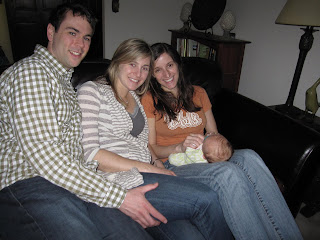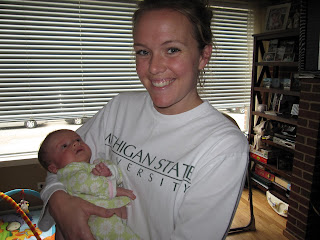Sophie
Our beautiful daughter Sophia Kathleen TerHorst (“Sophie”) was born on March 12, 2011. We love and adore her so much… beyond our wildest imagination… and cherish all of the incredible experiences we’ve shared with her so far. In almost every way, she is a normal 9 week old … eating, pooping, and occasionally sleeping. She’s very curious and aware of her surroundings.
The first few weeks:
Sophie’s rollercoaster journey started before birth… ultrasounds showed she was measuring on the small size during the second half of the pregnancy, which is referred to as “IUGR” (interuterine growth restricted). Liz was put on modified bed rest at week 36, and was induced at week 38. The thought by Liz’s doctors was that it would be better to induce and get Sophie growing outside the womb. The birth went really well and our amazing little peanut arrived at a whopping 4lbs 5oz (~3rd percentile) and 18.5 inches long at Northwestern Memorial Hospital here in Chicago. Sophie spent the first 5 days in the NICU due to low blood sugar levels and jaundice, but did really well through all of that and grew quickly.
During her first 5 weeks after the NICU, it was discovered that Sophie had a number of health issues (including a tethered cord, brachial plexus injury, and hemangiomas) that required a multitude of visits with doctors and specialists across multiple disciplines. Each issue was unrelated to the other. During these multiple doctor’s visits and through our own observations, it became apparent that Sophie had less than normal movement of her arms, legs, head and neck… or in other words, she had very low muscle tone. As the days went by, this became our main concern, as it can be the symptom of many different disorders. We proactively started physical therapy to work on this, as well as occupational therapy for her arm injury. We thought we were starting to get her health issues under control, but still wanted to figure out the cause of her low muscle tone.
The primary diagnosis – Spinal Muscular Atrophy:
During a regular checkup in week 6, we met with pediatrician Dr. Emily Cetner for the first time. Dr. Cetner shared our concern for Sophie’s low tone and immediately set us up with a pediatric neurologist. At the time we were very overwhelmed with Sophie’s other issues, and Dr. Cetner was the first person to really take charge and get Sophie the next level of care she needed.
We met with the neurologist the following Tuesday morning, and after her evaluation of Sophie, she explained that Sophie likely had a motor neuron disorder… and hinted that it might be Spinal Muscular Atrophy (“SMA”). This feedback came as a huge shock to us, and as we immediately did more research as soon as we stepped out of the doctor’s office, we quickly began to realize the potential magnitude of the situation. The more we read, the more we discovered that Sophie presented many of the preliminary signs of SMA… and the more devastated we became.
A series of blood and urine tests were completed right away, and the genetic test for SMA was taken a week later… however before we got any of the results, we were nearly certain within days that she indeed had SMA… and began to emotionally prepare for the dramatic impact it was going to have on all of our lives, most importantly Sophie’s. As we feared and expected, the SMA test came back positive a week later.
What is SMA?
In summary, SMA is a genetic, motor neuron disease. It is a relatively common "rare disorder": approximately 1 in 6,000 babies born are affected, and about 1 in 40 people are genetic carriers (unknowingly usually).
The muscles of patients with SMA weaken and waste away (atrophy) due to degeneration of motor neurons which are nerve cells in the spinal cord. Normally, these motor neurons relay signals, which they receive from the brain, to the muscle cells. When these neurons fail to function, the muscles deteriorate.
SMA affects muscles throughout the body, although the proximal muscles (those closest to the trunk of one’s body) are often most severely affected. Feeding, swallowing, and respiratory actions (breathing and coughing) can be affected, leading to an increased tendency for pneumonia and other lung problems. Note that brain activity, sensation and the ability to feel are not affected, and it is often observed that patients with SMA are unusually bright and sociable.
There is no cure for SMA, and as a result of the muscle degeneration and subsequent issues, life expectancy for infants diagnosed with SMA (type 1, which as what Sophie has) can be as short as days/weeks... and without aggressive intervention, is typically less then 2 years.
More information on SMA can be found on many websites… however we want to warn everyone that this is a really awful disorder… one of the worst things a parent could have to deal with… and there are many sad, depressing and scary stories on the web. We found the following site to contain a lot of helpful info to learn more about the disorder: http://www.fsma.org/FSMACommunity/UnderstandingSMA/
How are we dealing with this?
This has obviously been the hardest thing we’ve ever had to deal with in our lives… and honestly, some days and hours are better than others. We certainly went through the initial range of emotions (disbelief, fear, anger, jealousy, etc.) the first week before we even got the official diagnoses… but when it comes down to it, the only thing that matters is Sophie and what we can do to maximize the quality of her time with us.
The important thing to focus on right now is that Sophie isn’t experiencing any of the major effects of the disorder yet (and might not for a few months), and we are going to do everything in our power to make sure she is as happy and comfortable every single day. It’s easy to be jealous when we see families with healthy kids walking down the street, or mad when we see bad parents on the street or in the news… but none of that impacts Sophie. We strive to stay positive when we are with her (it’s amazing how she can sense our stress), and focus on all the things she enjoys such as:
- Walks in the neighborhood and park in the stroller
- Naps on the couch w/mom or dad’s chest
- Getting diaper changed
- Listening to mom and dad sing the MSU fight song
- Baths
- Getting licked by Bella, that big curly goldendoodle who still hasn’t quite figured her out
Treatment / Care:
As noted above, there is no treatment or cure for SMA, and the disease is degenerative (meaning it will continue to get worse over time). Care options vary, and parents must make difficult decisions regarding the path of care for their children. Parents have different views on quality of life, and different views on the likelihood and future time for a treatment or cure for the disease.
As such, parents make a range of different care choices for their children... some parents choose to go to any measure to keep their child alive for as long as possible... while some parents focus less on maximizing the length of life and more so on maximizing the child's comfort every single day (aka a ‘palliative’ care approach).
Every parent does what they think is best for their child... and there is no one right decision to this awful situation. With that said, we ask that everyone respect our decisions regarding Sophie’s care. While we will continue to learn more and make many difficult decisions along the way, our focus is going to be on maximizing Sophie’s comfort level and quality of life.
Sophie’s positive impact on others:
Sophie has already enriched our lives so much and will be a part of our family forever. Beyond her direct impact on us, we’re going to look into the ability to donate her organs to other young children… we see so many needy kids when we are at Children’s Memorial Hospital every week, and hope that her organs can save/improve the lives of a number of other kids.
In addition, given that SMA is a genetic disorder, we are not sure if we will have any other biological children in the future (more to be learned on this topic)… however even before we had Sophie, we strongly considered adopting one day after seeing so many amazing children during some of our international travels. After Sophie, we’ll likely adopt and give a child/children a chance for a better life that they might not have ever had.
How can people help?
So many people have already asked how they can help, and we greatly appreciate everyone’s kind thoughts and offers. We’re sure our needs will change over time, but overall here are the primary things that come to mind:
1. Please don't feel like the need to "say the right thing"... this is a really difficult situation for everyone, and simple statements/messages letting us know that Sophie is in your thoughts are much appreciated.
2. Please continue to update us with all of the good things going on in everyone’s lives… we will always think about Sophie every single day, and hearing stories about other people’s lives, families, trips, etc. won't make it any more difficult… if anything, it will be helpful to share in the stories and joys of everyone around us.
3. When spending time with us and Sophie, please share our focus on providing a positive environment around her… we certainly understand that emotions take over at times with this situation, but it is important to keep the focus on maximizing the happiness and comfort around her.
4. Please respect our treatment and care decisions in the future. As noted above, there is no one right solution for all families in this situation, and while we appreciate everyone’s concern and support for Sophie, we are going to do what we feel is best for her at every point along the way.
5. Please consider getting involved in SMA awareness activities… we’ll continue to learn more about these and share information about opportunities in the future.
Thank You’s:
Sophie has met so many incredible people in her life already, and we’d like to acknowledge the many people that have helped and supported her along the way so far.
First, we’d like thank our family and friends… you’ve been such a great support system for Sophie and us! We are blessed to have you in our lives.
Second, thank you to our co-workers and managers who have been so flexible and supportive with our work/life balance through all of this.
Third, thank you to the many healthcare providers that have helped Sophie so far, including the various teams at Children’s Memorial Hospital (Colleen Glomgren, Physical Therapy; Leslie Rodman, Occupational Therapy; Dr. Anthony Mancini, Dermatology; Susan, Speech / Swallow Therapy; Tord Alden, Neurosurgery; and Dr. Shubhra Mukherjee, Physiatry), Advocate Medical Group (Dr. Farha Kahn, Neurology), the NICU staff at Northwestern Memorial, and last but not least, Dr. Emily Cetner from Town & Country Pediatrics (thanks for everything Dr. Cetner).
Love,
Liz, Mike, & Sophie
 Here are some of my favorite people:
Here are some of my favorite people: Bella...curious
Bella...curious Eric B.
Eric B. Nurse Lynda
Nurse Lynda Chelsea and Alex
Chelsea and Alex Juli and Andy
Juli and Andy The Walker Family
The Walker Family Aunt Katie
Aunt Katie Tim and Norah
Tim and Norah Monica and Norah
Monica and Norah Uncle David, Aunt Janet, Emma
Uncle David, Aunt Janet, Emma Craig, Cara, and Noelle (Sophie not pictured)
Craig, Cara, and Noelle (Sophie not pictured) The Oatleys
The Oatleys Cheryl Davis and Family
Cheryl Davis and Family Zoe and Tag
Zoe and Tag Uncle Brad and Aunt Jenny
Uncle Brad and Aunt Jenny Carla and Joel
Carla and Joel


















